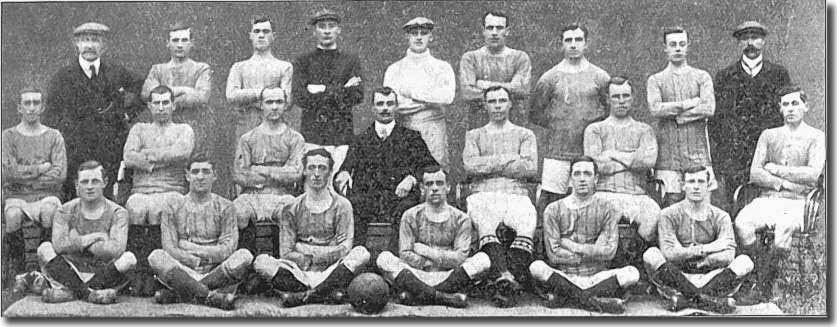 Part
2 - Results and table
Part
2 - Results and table
After the initial rush of expectancy and excitement following the appointment
of a new man at the helm in 1908, the season that
followed for Leeds City ended disappointingly.
Incoming manager Frank Scott-Walford
had brought great hope to Elland Road, along with a clutch of recruits
from the Southern League. They promised much in the early weeks, even
flirting with the top of the table after four games, but by the end of
the campaign City had taken several steps backwards.
They matched 1908's 12th place finish but
much of the football the team played was a pale reflection of the players'
potential and there was dissatisfaction all round. The board of directors
glared balefully at the record £1,200 loss that the club posted and put
Scott-Walford on notice that improvement was essential rather than an
optional extra.
Determined to address the team's deficiencies, the manager set about
ringing the changes and there were a great number of comings and goings
during the summer of 1909. With funds so tight, Scott-Walford took the
low budget approach after splashing the cash a year earlier and he spent
the summer checking out the talent in Ireland. He returned to Yorkshire
with two 21-year-old forwards, Tom 'Steve' Mulholland and Billy Halligan,
and was to be a regular visitor to the Emerald Isle over the next few
seasons as he mined a cheap seam of talent.
The manager signed a number of other promising players, such 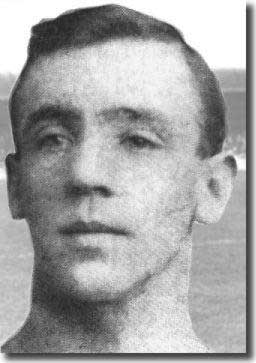 as
half-back Haydn Price from Wrexham, the holder of five Welsh caps who
had previously been at Aston Villa. He was joined by his countryman, winger
Hugh Roberts from Southport Central, veteran Stoke outside-left Harold
Bridgett, Chester's amateur winger Colin Stockton, Newark centre-half
Jimmy Horsley and three young Scots, Hugh Beren, George Affleck and Ted
Hamilton.
as
half-back Haydn Price from Wrexham, the holder of five Welsh caps who
had previously been at Aston Villa. He was joined by his countryman, winger
Hugh Roberts from Southport Central, veteran Stoke outside-left Harold
Bridgett, Chester's amateur winger Colin Stockton, Newark centre-half
Jimmy Horsley and three young Scots, Hugh Beren, George Affleck and Ted
Hamilton.
The signature of goalkeeper Tony Hogg from Walker-on-Tyne Church Lads
Brigade in April prompted this endorsement in the Leeds Mercury
from the Reverend A G Wardroper, the vicar in the player's home town:
'Hogg has had a trial at Elland Road, and gave great satisfaction. He
is only just over 18 years of age, but his height and activity should
help him as a clever custodian. The Walker Church Lads Brigade has won
every league or cup it entered for and this last season Hogg only let
17 shots past him in 28 league games. The team had 142 goals to its credit,
and won every match but one. We congratulate the directors and Mr Scott-Walford
on getting Hogg.'
On the way out were Scott-Walford's signings of twelve months earlier,
Jock Hamilton, Dickie Guy (neither of whom had really made the grade in
their season at Elland Road) and Tom Rodger (who had promised much in
his early months but faded badly after Christmas). He also released three
seasoned campaigners, full-back David Murray and wing-halves Charlie Morgan
and Jimmy Kennedy.
As City and the rest of the country's clubs made their preparations for
the 1909/10 campaign, events were overshadowed by the dispute that exploded
between the football authorities and increasingly restive players.
Tim Hill writing in A Photographic History of English Football:
'Burgeoning interest inevitably meant that football was no longer simply
sport and entertainment but also big business. Some of the top clubs started
to show extremely healthy balance sheets, and it wasn't long before players
began to demand a bigger slice of the cake. In April 1901 a new maximum
wage of £4 a week was introduced. This compared favourably with other
skilled tradesmen of the day (Four pounds a week was twice what a works
foreman took home and nearly four times the average wage of a farm labourer),
but players began to recognise their worth and started to express dissatisfaction.
Matters came to a head in 1907 with the formation of a Players' Union.
The League and FA were worried about players becoming organised, possibly
even affiliating to the Trades Union movement. They threatened to impose
a ban on players who took up union membership. Manchester United star
Billy Meredith was one of a vociferous group unwilling to be browbeaten.
While many players lost their nerve and fell into line, Meredith led a
group of players who threatened to withdraw all their labour. Prior to
the 1909/10 season they began training independently under the banner
of The Outcasts.'
The main drivers of the revolt were the Lancashire clubs' players - as
late as Monday 30 August, a week prior to the season's opening games,
the local papers were full of news from across the Pennines. A meeting
in Manchester the previous evening drew about two hundred players to it,
with representatives from all of the county's league clubs, except Blackburn
Rovers, 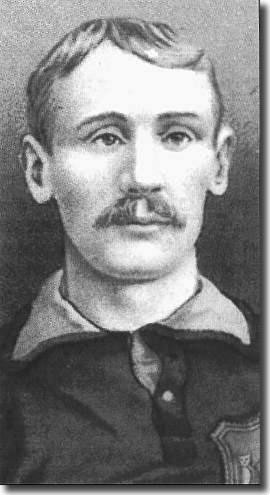 Preston
North End and Blackpool. As the Yorkshire Post noted, 'A resolution
espousing loyalty to the Union was carried without the slightest opposition.
Only two men did not vote in favour of it, and they explained that they
had promised not to pledge themselves until a full meeting of the clubs
they represented had been held. An official statement was made that the
Tottenham, Chelsea and Fulham players had agreed to support the Union
and a paper was produced on which the majority of the Aston Villa and
West Bromwich Albion men had signed a pledge of support.'
Preston
North End and Blackpool. As the Yorkshire Post noted, 'A resolution
espousing loyalty to the Union was carried without the slightest opposition.
Only two men did not vote in favour of it, and they explained that they
had promised not to pledge themselves until a full meeting of the clubs
they represented had been held. An official statement was made that the
Tottenham, Chelsea and Fulham players had agreed to support the Union
and a paper was produced on which the majority of the Aston Villa and
West Bromwich Albion men had signed a pledge of support.'
21 Everton professionals joined the Players' Union, and all of Manchester
City's players did the same after previously being thought to be loyal
to the FA. 27 Manchester United players were suspended because of their
allegiance to the Union and there were fears that virtually the entire
programme of opening day fixtures would be called off.
There was less of an appetite for industrial action in Yorkshire, with
only Bradford City players throwing their weight behind the Union, and
it was reported that Leeds City's players 'have decided unanimously that
their interests can best be served by having nothing to do with the Players'
Union'.
In the end, a deal was struck between the warring parties and the maximum
wage was increased to £5 a week.
As the dust settled on the affair, the Peacocks entertained Lincoln City
at Elland Road in their opening game on Wednesday, September 1. Colin
Stockton, Tom Mulholland and Billy Halligan all debuted in the Leeds attack.
Popular custodian Harry Bromage was recalled at the expense of Tom Naisby
while Jock Watson and Jack White continued the full-back partnership that
had operated so successfully throughout 1908/09.
The half-back line of Tom McAllister, Tom Morris and Stan Cubberley that
had bonded formidably as a unit over the spring remained in situ, while
the reliable Jimmy Gemmell and Fred Croot retained their places in attack.
The Citizens blended well from the off, despite slippery conditions following
a heavy storm in the half hour before the game commenced. The visitors
included only four players, full-back Wilson, half-backs Nesbit and Fraser
and left winger Grundy, who had been in the team the previous season,
and they struggled to gel as 'they showed little combination, much steadiness
and practically no resolution' according to Flaneur in the Leeds Mercury.
He went on, 'Leeds City had three new men on view, Halligan, Mulholland
and Stockton. The Irishmen got well on to their game in the second half,
and the whole team improved very greatly as the game progressed. They
were much less troubled by the difficulties of the ground than their opponents,
and, getting a two-goal lead in the first half, both successful shots
being put in by Gemmell, they played through the second period with plenty
of confidence and much better combination.
back to top
'The visitors made a spurt or two at the close, but they were kept out
fairly easily by Watson and White, and by Bromage, who was very sound
in goal. The defence was, indeed, quite good, and the attack was always
more dangerous and finished than that of the opposition. The half-backs,
especially Cubberley, were rather shaky at the outset, but they soon pulled
themselves together, and both in attack and defence they acquitted themselves
well. But Cubberley, Morris and McAllister are well known at Elland Road
and chief interest was centred in the play of the new forwards. Stockton
was rather disappointing, but the Irish couple came on splendidly in the
second half and Halligan's two goals were very cleverly scored. The fifth
goal was put through by Morris from a free kick.
'Satisfactory as the new Irish forwards played, the star of the line
was Gemmell, who commenced well, and kept up his form throughout. Croot
was just the Croot of old at outside-left and, with an improvement on
the other 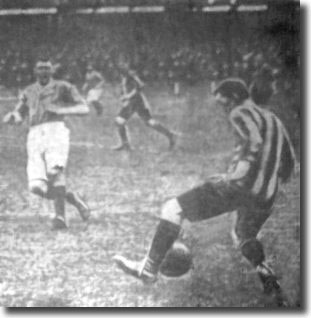 wing
and match practice, Leeds City should be quite a useful Second League
side.'
wing
and match practice, Leeds City should be quite a useful Second League
side.'
It was a wonderful start for the Citizens and Scott-Walford was content
to send out an unchanged eleven for a Yorkshire derby three days later
at Hull. Unfortunately, they were roundly trounced, lucky to escape with
a 3-1 defeat. Only the goalkeeper emerged with credit, as recorded by
Olympian in the Mercury: 'That the number of goals was kept so
low as three was to the credit of one man alone, Bromage. He put forth
a wonderfully cool saving exhibition, especially in the second half, when
he was kept fully employed.'
It might have been a different story had young Stockton took the open
goal that was presented to him in the opening quarter, but the winger
was clearly struggling to come to terms with Second Division football.
Billy Halligan scored again, but his effort was a mere consolation in
the face of a hat trick by the Tigers' Jack Smith. Defeat at Anlaby Road
was nothing new: Leeds had yet to win there, shipping four goals in each
of the previous two seasons. Managed by Ambrose Langley, the East Yorkshire
team were formidable opponents, fielding two other famous Smiths in their
forward line, Joe and Wallace, also boasting the talents of Alf Toward
and Eddie Neve. They had come close to promotion in the spring and were
to mount an even more serious challenge this season. Their display as
they swept the Elland Road men aside was impressive.
A return to their home turf brought a return to winning ways as the Citizens
defeated unbeaten Derby County 2-1, despite a splendid performance by
keeper Harry Maskrey, who had won an England cap in 1908. Billy McLeod
returned to the forward line in place of Mulholland and Haydn Price made
his debut at left-half. The changes peppered up the team and both men
played well as City recaptured their form.
The first half hour was evenly fought - the Rams had the best moments,
but Leeds took the lead after 35 minutes, as reported in the Yorkshire
Post: 'A fine goal by Croot delighted the spectators. But although
the outside-left scored cleverly, almost equal credit is due to McLeod
for the way he engineered the opening, which gave Croot the opportunity.
The centre-forward's pass to the left was excellently judged, and the
City forward's combat with Nicholas on the goal line was worth watching.
Ultimately Croot triumphed, his shot being at an acute angle.'
Seconds later, Derby equalised when inside-left Barnes beat both McAllister
and Watson before firing in a long-range shot.
City had to defend in depth after the break, but gradually got back on
top as Gemmell and Halligan pressed Maskrey. Leeds made their possession
count and McLeod's neat pass allowed Halligan to dash between the backs
and slam the ball home to loud cheers. Harry Bromage withstood a number
of hot attacks thereafter to secure the points for his team, though County
were unfortunate not to force a draw on the run of play.
Sportsman in the Mercury: 'In the City goal, Bromage made a number
of clever saves … Watson gave a sound and reliable display at right-back
and more than once in the first half he came to the relief of his partner.
Before the interval White was rather shaky, but afterwards he improved
considerably, and finished well. The Welsh international, Haydn Price,
made his first appearance for City, and was quite the best man in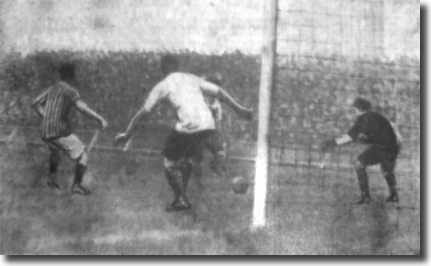 the intermediate line. In the second half especially, his defensive work
was clever while he often sent Gemmell and Croot on their way with smart
passes. McAllister was only moderate, but the weak spot of the line was
at centre-half, where Morris was at times extremely slow and hesitating.
Forward, Croot gave a fine display at outside-left, and, playing with
dash and determination, was a constant source of trouble to Barbour and
Nicholas, who were more than once beaten by his speed. Halligan was rather
neglected by both McLeod and Stockton, but he made the most of the few
chances put in his way, and his goal was a beauty. McLeod was lacking
in dash and energy, and as a distributing force he was not altogether
a success. He did, however, play an excellent part in the work that led
to Halligan's goal. Gemmell was very useful, but on the right wing Stockton,
who is slow in getting away with the ball, was rather weak.'
the intermediate line. In the second half especially, his defensive work
was clever while he often sent Gemmell and Croot on their way with smart
passes. McAllister was only moderate, but the weak spot of the line was
at centre-half, where Morris was at times extremely slow and hesitating.
Forward, Croot gave a fine display at outside-left, and, playing with
dash and determination, was a constant source of trouble to Barbour and
Nicholas, who were more than once beaten by his speed. Halligan was rather
neglected by both McLeod and Stockton, but he made the most of the few
chances put in his way, and his goal was a beauty. McLeod was lacking
in dash and energy, and as a distributing force he was not altogether
a success. He did, however, play an excellent part in the work that led
to Halligan's goal. Gemmell was very useful, but on the right wing Stockton,
who is slow in getting away with the ball, was rather weak.'
The ineffectual display, in fact, spelt the end for Colin Stockton. He
was dropped and never again featured in the first team. David Dougal was
drafted back in on the right wing for the time being. With Billy McLeod
giving way temporarily to Dickie Joynes, City could only manage a spiritless
0-0 draw at Stockport County. McLeod was back for the Elland Road tussle
with Glossop and managed a second half goal, but City were already two-down
and though they subsequently hinted that they might equalise, it was once
more Harry Bromage in goal who was the star performer On the day the Derbyshire
side were by far the superior side.
Two Billy Halligan goals gave City a half time advantage a week later
at Birmingham and they managed to withstand a second half assault by the
Midlanders to finish with an encouraging 2-1 victory, but the team lost
their way badly thereafter, struggling to cope with the prolonged absence
through injury of McLeod. Halligan kept the goals flowing, and it was
in defence that the Citizens were most obviously lacking.
It took a second half West Bromwich penalty to deny City a draw from
a well-fought game at the Hawthorns - Bromage had once again been in splendid
form, but he could not hold Leeds together single-handed and he badly
needed some protection in front of him.
There was a second narrow defeat within seven days when a goal in the
last minute by Oldham's Len Newton proved decisive at Boundary Park on
16 October following Halligan's 80th-minute equaliser. City had been badly
handicapped by the loss of right winger Edward Hamilton at the start of
the second half. It was Hamilton's first team debut after a move from
Petershill in August and he badly bruised his ribs in an earlier tumble.
If City were unlucky on that occasion, the outcome was rather more clear
cut a week later when they sustained a record defeat in the game against
Barnsley at Elland Road.
A close contest had been expected, but Barnsley, playing with the advantage
of a strong breeze in the first half, quickly dispelled that notion. After
ten minutes inside-right Ernie Gadsby headed home from a corner. Seventeen
minutes later, outside-left Tom Forman repeated the trick. Before the
break, Gadsby notched his second after good work by Forman and George
Lillycrop and the South Yorkshire outfit took their half-time refreshments
leading 3-0.
Things went from bad to worse after the interval. A hard drive by Barnsley
left-back Harry Ness struck the luckless Hamilton on his right arm, badly
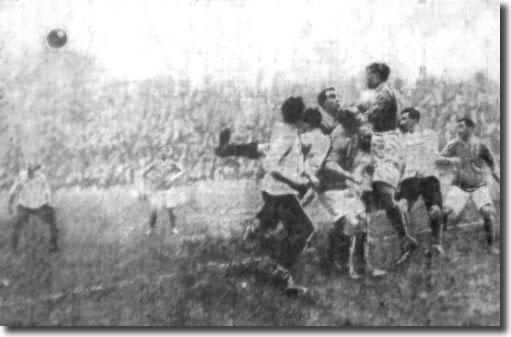 dislocating
his elbow. He had little choice but to go off and the odds were stacked
heavily against the Citizens from then on. Skipper Jock Watson, with a
startling piece of ill judgement, opted to take Hamilton's spot on the
right wing and left Jack White to face the five rampaging Barnsley forwards
on his own. Behind him, Harry Bromage performed miracles, but he could
not stem the tide as Lillycrop and Harry Tufnell snatched a brace apiece
to leave the final score an embarrassing 7-0.
dislocating
his elbow. He had little choice but to go off and the odds were stacked
heavily against the Citizens from then on. Skipper Jock Watson, with a
startling piece of ill judgement, opted to take Hamilton's spot on the
right wing and left Jack White to face the five rampaging Barnsley forwards
on his own. Behind him, Harry Bromage performed miracles, but he could
not stem the tide as Lillycrop and Harry Tufnell snatched a brace apiece
to leave the final score an embarrassing 7-0.
Flaneur in the Leeds Mercury: 'Barnsley … had a day out. They
were a confident, clever team in all departments and it is a long time
since I have seen a side show such a remarkable understanding. The difference
between the ragged work and absence of combination on the Leeds City side
and the perfect rhythm of the Barnsley play was very striking … The glory
of the Barnsley team was the forward line, every member of which played
delightful football. Bartrop was the only forward who failed to score,
yet, if any distinction be made among the five, the outside-right was
the best of all. His fast runs up the wings, the ease with which he beat
Cubberley and White, and his fine centres all stamped him as a player
who must have a great future.
back to top
'The pivot on which the Barnsley forward work depended was centre-half,
where Boyle played a great game, and was well assisted by Glendinning
and Utley. These men were much more than defenders; they placed the ball
to their forwards with skill and judgement, and they were always capable
of holding the City inside men. Soundness also marked the work of the
backs, Ness and Downs, though I would suggest to this pair the inadvisability
of shaking hands with each other to mark a successful clearance. The hand
shaking clowning at the scoring of each goal, which is such a feature
of Association football, is merely silly; when it is done by two backs
in front of their own goal it becomes dangerous. Perhaps Barnsley could
afford exhibition tricks on Saturday, but some day it may prove fatal.
'Seven goals to none! The thing seems incredible. Yet that was the score
by which the gallant little band of footballers from the South Yorkshire
town defeated "the best team" (I am quoting from a contemporary)
"the Leeds City directors can put into the field from the material
at their command." And this crushing defeat - or shall we say slaughter?
- occurred, mark you, on the Elland Road ground at the instance of a team
that had never previously won on the enclosure.'
The defeat came as a sore blow to City, at a time when they had just
made an appeal to shareholders for additional funds as they struggled
to balance the books. They stood fifteenth out of 20 teams, just two points
above the bottom two. Things looked bleak, indeed.
| |
Bottom of Division Two - 30 October 1909 |
| |
Pos
|
|
P
|
W
|
D
|
L
|
F
|
A
|
Pts
|
| |
12th
|
Bradford
Park Avenue |
10
|
4
|
1
|
5
|
13
|
15
|
9
|
| |
13th
|
Stockport
County |
11
|
3
|
3
|
5
|
10
|
12
|
9
|
| |
14th
|
Oldham
Athletic |
9
|
3
|
2
|
4
|
11
|
11
|
8
|
| |
15th
|
Birmingham
|
10
|
2
|
4
|
4
|
17
|
19
|
8
|
| |
16th
|
Clapton
Orient |
11
|
3
|
2
|
6
|
11
|
19
|
8
|
| |
17th
|
Lincoln
City |
11
|
2
|
4
|
5
|
12
|
26
|
8
|
| |
18th
|
Leeds
City |
10
|
3
|
1
|
6
|
13
|
22
|
7
|
| |
19th
|
Gainsborough
Trinity |
11
|
2
|
1
|
8
|
13
|
31
|
5
|
| |
20th
|
Grimsby
Town |
10
|
1
|
1
|
8
|
7
|
21
|
3
|
| |
|
|
|
|
|
|
|
|
|
A 5-1 thrashing at Fulham on 30 October saw the Peacocks slip further
down the table and their performance was every bit as insipid as the score
suggested, as confirmed by Wanderer in the Mercury: 'The forwards
did not seem to realise the necessity of getting away with the ball when
they received it. They dallied far too much, and the consequence was that
they were robbed as often as not. And they did not infuse enough dash
into their play. As often as not when a half-back was about to make a
pass, the forward for whom it was intended would turn his back on the
goal and calmly wait for the ball, only to find that one of the Fulham
defenders was round him like a flash and off with the ball. Halligan and
Joynes were responsible for what little good work there was, but they
rarely gave one any hope of scoring. Perhaps the quintet did not receive
enough support from the halves, who were absolutely swamped by the Fulham
forwards; but still, that cannot be put forward as an excuse for their
mediocre display. The City middle line was not very satisfactory, and
gave the Fulham forwards far too much latitude. Cubberley was quite off
his defensive game, which is usually his forte, and Beren and Morris were
rarely reliable.'
City recovered some ground a week later when a goal by Halligan was enough
to secure a home win against Burnley, and there was much to enjoy in the
first team debuts by full-back George Affleck and centre-half James Horsley,
while the return from injury of Billy McLeod for only his third start
of the campaign brought fresh impetus to the attack. McLeod managed a
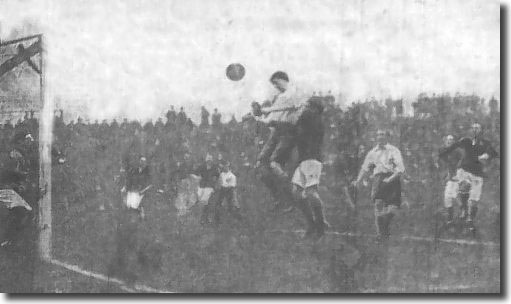 brace
a week later at home to Bradford Park Avenue, but the visitors secured
the points with a 3-2 win. That game marked the start of a run of six
games that saw but a single point returned. In that time, City crashed
5-0 at Wolverhampton and lost 6-2 at Leicester Fosse on 18 December. The
latter reverse left City deep in trouble, with the division's worst defensive
record, having conceded 42 goals in just 17 games.
brace
a week later at home to Bradford Park Avenue, but the visitors secured
the points with a 3-2 win. That game marked the start of a run of six
games that saw but a single point returned. In that time, City crashed
5-0 at Wolverhampton and lost 6-2 at Leicester Fosse on 18 December. The
latter reverse left City deep in trouble, with the division's worst defensive
record, having conceded 42 goals in just 17 games.
On the credit side, McLeod (5 goals in 7 games) and Halligan (11 in 17)
were proving a productive combination up front, while 22-year-old Hugh
Roberts seemed to have solved the difficulties at outside-right and the
sturdy Affleck had become a fixture at left-back. The Scottish defender's
introduction to the first team had brought four defeats in his first five
appearances, but his presence brought solidity and a no nonsense approach
to the rearguard.
Elland Road had been chosen to host the amateur international between
England and Ireland on 20 November, which ended in a thrilling 4-4 draw
though the unfancied men from the Emerald Isle almost pulled off a breathtaking
victory. The occasion was a real feather in the cap for the City board
and both club and enclosure were roundly praised for their hospitality.
Flaneur marked the occasion with an article in the Leeds Mercury
two days later, and used the opportunity to summarise the size of the
task facing a young club with high aspirations: 'The time seems to have
arrived for a little plain speaking about the Leeds City Club. Little
more than a month ago, Mr Joseph Henry, vice chairman of directors of
the club, told a meeting of shareholders that the club had a body of young
players, and that there was every prospect of success if these men could
be kept together. At the time these words were uttered, Leeds City had
won three matches, lost four and drawn one, with a total of seven points
out of a possible 16. They had scored 12 goals to 10, and occupied eleventh
position in the league table.
'It may be said that a club with an overdraft of £9,000, a club seeking
a public to take up nearly 3,000 additional shares - and seeking, I should
imagine, without much success, though I have no information on the point
- have no money wherewith to purchase players of repute. Thus are past
follies coming home to roost. Much money has been spent in the past on
players with indifferent qualifications; many good men have been allowed
to leave Elland Road, some of them a good deal better than a number of
the players on the books today; and a sum of £8,117 has been spent on
the ground.
| |
Bottom of Division Two - 28 December 1909 |
| |
Pos
|
|
P
|
W
|
D
|
L
|
F
|
A
|
Pts
|
| |
12th
|
Bradford
Park Avenue |
19
|
8
|
2
|
9
|
28
|
30
|
18
|
| |
13th
|
Oldham
Athletic |
17
|
7
|
3
|
7
|
21
|
25
|
17
|
| |
14th
|
Stockport
County |
20
|
5
|
6
|
9
|
19
|
24
|
16
|
| |
15th
|
Clapton
Orient |
20
|
6
|
3
|
11
|
22
|
32
|
15
|
| |
16th
|
Leeds
City |
20
|
6
|
3
|
11
|
25
|
45
|
15
|
| |
17th
|
Lincoln
City |
18
|
3
|
7
|
8
|
20
|
34
|
13
|
| |
18th
|
Gainsborough
Trinity |
20
|
5
|
3
|
12
|
21
|
49
|
13
|
| |
19th
|
Birmingham |
19
|
3
|
5
|
11
|
23
|
44
|
11
|
| |
20th
|
Grimsby
Town |
19
|
3
|
2
|
14
|
16
|
43
|
8
|
| |
|
|
|
|
|
|
|
|
|
'The ground is a fine one; it is worthy of a replayed Cup semi final
or an international match of greater public interest than the amateur
event of last Saturday; but a great and well appointed ground is something
of a white elephant when the team that plays upon it is of such poor class.
The Leeds City directors have put the cart before the horse. They might
have taken a leaf out of Bradford City's book. The Bradford City directors
built up a team first; they made a position in the world of football;
and then they proceeded to improve their ground.
'This, I admit, is not constructive criticism, for the solution of the
difficulty is obvious. The public are not likely to subscribe further
share capital until they see that efforts are being made to remedy the
weaknesses in the team; they are not likely to add largely to the club's
revenue at the gates until the team play better football and win matches.
The directors must themselves find sufficient money, by hook or crook,
to purchase a few players of class; they must see that the present system
of chopping and changing is eliminated.'
Thankfully, three goals from Hugh Roberts and two from Billy McLeod secured
two Elland Road victories in Christmas week and brought some optimism,
but a tame goalless draw at troubled Lincoln City on 28 December showed
that the Peacocks were building on shallow foundations. They entered 1910
a mere four points clear of the re-election places and facing a bleak
New Year.
Part 2 -
Other Football Highlights from 1909/10
- Aston Villa won their sixth league title, their first for 10 years,
finishing with a record-equalling 53 points, five ahead of runners up
Liverpool
- Newcastle finally buried their Cup jinx, beating Second Division Barnsley
2-0 in a replayed final at Goodison Park. But they were roundly condemned
for their win at all costs attitude
- Celtic won the Scottish league for the sixth time in a row
- Vivian Woodward became the first player to score double hat tricks
in two games, when he hit six goals for England in the amateur international
against Holland at Stamford Bridge on December 11. The famous Tottenham
Hotspur centre forward and Olympic gold medallist had scored a phenomenal
eight times against France three years earlier, also in an amateur international
back to top












 as
half-back Haydn Price from Wrexham, the holder of five Welsh caps who
had previously been at Aston Villa. He was joined by his countryman, winger
Hugh Roberts from Southport Central, veteran Stoke outside-left Harold
Bridgett, Chester's amateur winger Colin Stockton, Newark centre-half
Jimmy Horsley and three young Scots, Hugh Beren, George Affleck and Ted
Hamilton.
as
half-back Haydn Price from Wrexham, the holder of five Welsh caps who
had previously been at Aston Villa. He was joined by his countryman, winger
Hugh Roberts from Southport Central, veteran Stoke outside-left Harold
Bridgett, Chester's amateur winger Colin Stockton, Newark centre-half
Jimmy Horsley and three young Scots, Hugh Beren, George Affleck and Ted
Hamilton. Preston
North End and Blackpool. As the Yorkshire Post noted, 'A resolution
espousing loyalty to the Union was carried without the slightest opposition.
Only two men did not vote in favour of it, and they explained that they
had promised not to pledge themselves until a full meeting of the clubs
they represented had been held. An official statement was made that the
Tottenham, Chelsea and Fulham players had agreed to support the Union
and a paper was produced on which the majority of the Aston Villa and
West Bromwich Albion men had signed a pledge of support.'
Preston
North End and Blackpool. As the Yorkshire Post noted, 'A resolution
espousing loyalty to the Union was carried without the slightest opposition.
Only two men did not vote in favour of it, and they explained that they
had promised not to pledge themselves until a full meeting of the clubs
they represented had been held. An official statement was made that the
Tottenham, Chelsea and Fulham players had agreed to support the Union
and a paper was produced on which the majority of the Aston Villa and
West Bromwich Albion men had signed a pledge of support.' wing
and match practice, Leeds City should be quite a useful Second League
side.'
wing
and match practice, Leeds City should be quite a useful Second League
side.' the intermediate line. In the second half especially, his defensive work
was clever while he often sent Gemmell and Croot on their way with smart
passes. McAllister was only moderate, but the weak spot of the line was
at centre-half, where Morris was at times extremely slow and hesitating.
Forward, Croot gave a fine display at outside-left, and, playing with
dash and determination, was a constant source of trouble to Barbour and
Nicholas, who were more than once beaten by his speed. Halligan was rather
neglected by both McLeod and Stockton, but he made the most of the few
chances put in his way, and his goal was a beauty. McLeod was lacking
in dash and energy, and as a distributing force he was not altogether
a success. He did, however, play an excellent part in the work that led
to Halligan's goal. Gemmell was very useful, but on the right wing Stockton,
who is slow in getting away with the ball, was rather weak.'
the intermediate line. In the second half especially, his defensive work
was clever while he often sent Gemmell and Croot on their way with smart
passes. McAllister was only moderate, but the weak spot of the line was
at centre-half, where Morris was at times extremely slow and hesitating.
Forward, Croot gave a fine display at outside-left, and, playing with
dash and determination, was a constant source of trouble to Barbour and
Nicholas, who were more than once beaten by his speed. Halligan was rather
neglected by both McLeod and Stockton, but he made the most of the few
chances put in his way, and his goal was a beauty. McLeod was lacking
in dash and energy, and as a distributing force he was not altogether
a success. He did, however, play an excellent part in the work that led
to Halligan's goal. Gemmell was very useful, but on the right wing Stockton,
who is slow in getting away with the ball, was rather weak.' dislocating
his elbow. He had little choice but to go off and the odds were stacked
heavily against the Citizens from then on. Skipper Jock Watson, with a
startling piece of ill judgement, opted to take Hamilton's spot on the
right wing and left Jack White to face the five rampaging Barnsley forwards
on his own. Behind him, Harry Bromage performed miracles, but he could
not stem the tide as Lillycrop and Harry Tufnell snatched a brace apiece
to leave the final score an embarrassing 7-0.
dislocating
his elbow. He had little choice but to go off and the odds were stacked
heavily against the Citizens from then on. Skipper Jock Watson, with a
startling piece of ill judgement, opted to take Hamilton's spot on the
right wing and left Jack White to face the five rampaging Barnsley forwards
on his own. Behind him, Harry Bromage performed miracles, but he could
not stem the tide as Lillycrop and Harry Tufnell snatched a brace apiece
to leave the final score an embarrassing 7-0. brace
a week later at home to Bradford Park Avenue, but the visitors secured
the points with a 3-2 win. That game marked the start of a run of six
games that saw but a single point returned. In that time, City crashed
5-0 at Wolverhampton and lost 6-2 at Leicester Fosse on 18 December. The
latter reverse left City deep in trouble, with the division's worst defensive
record, having conceded 42 goals in just 17 games.
brace
a week later at home to Bradford Park Avenue, but the visitors secured
the points with a 3-2 win. That game marked the start of a run of six
games that saw but a single point returned. In that time, City crashed
5-0 at Wolverhampton and lost 6-2 at Leicester Fosse on 18 December. The
latter reverse left City deep in trouble, with the division's worst defensive
record, having conceded 42 goals in just 17 games.